Inflation Rising To Well Over 50% In Iran
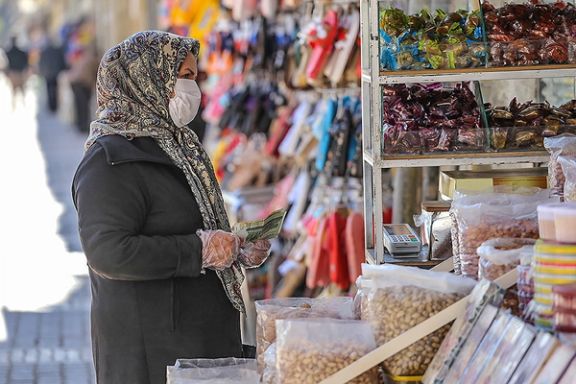
For the fifth time since March 2022, the point-to-point inflation index in Iran exceeded 50% reaching 53.4% in the Iranian month ending on February 20.

For the fifth time since March 2022, the point-to-point inflation index in Iran exceeded 50% reaching 53.4% in the Iranian month ending on February 20.
The index shows that families have spent 53% more on buying the same goods and services in comparison to the same period last year.
The main reason for the jump in prices has been the daily decline in the value of the national currency. The US dollar has climbed to more than 500,000 rials this week, a more than 60 percent decline for the Iranian currency since August.
Meanwhile, official figures show food prices rising well over 70 percent in the past 12 months as a falling currency makes imports more expensive.
Reports say the highest monthly inflation rate has been recorded for meat and vegetables. In the past month, meat had an inflation rate of 10.5% and vegetables 4.4%, which is the highest level of inflation among food items.
Reza Gheibi, an economy journalist told Iran International that Iran is expected to experience higher inflation in the coming months as the government is not able to take any tangible measures to control soaring prices.
“If the over-50-percent inflation continues in the next months, it would turn into hyper-inflation and Iran would turn into a new Venezuela,” noted Gheibi.
In the past days, many citizens reported a sharp rise in food prices, especially red meat and nuts.
Inflation along with the decrease in people's purchasing power may lead to more anti-government protests in the already tense situation.
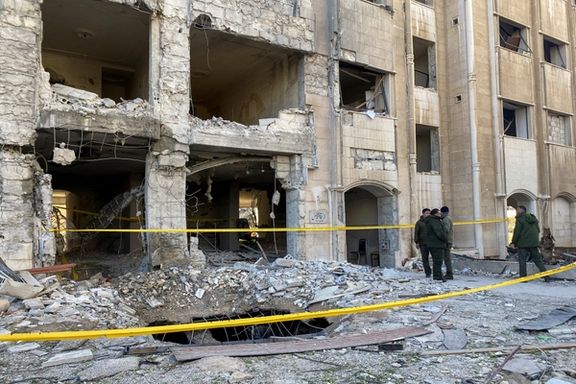
A rocket attack in Damascus on Sunday blamed on Israel hit an installation where Iranian officials were meeting on developing drone or missile capabilities of allies in Syria, sources told Reuters.
Iran has been a major backer of President Bashar al-Assad during Syria's nearly 12-year conflict. Its support for Damascus and the Lebanese group Hezbollah has drawn regular Israeli air strikes meant to curb Tehran's extraterritorial military power.
A source close to the Syrian government with knowledge of Sunday's strike and its target said it hit a gathering of Syrian and Iranian technical experts in drone manufacturing, though he said no top-level Iranian was killed.
"The strike hit the center where they were meeting as well as an apartment in a residential building. One Syrian engineer and one Iranian official - not high-ranking - were killed," the source told Reuters.
This rocket strike, along with others that Israel says target infrastructure of Syria's military and its allies, reflect an escalation of what has been a low-intensity conflict aimed at slowing down Iran's growing entrenchment in Syria, according to Israeli military experts.
Syrian state media said at the time that Israel had carried out air strikes shortly after midnight on Sunday against several areas of the Syrian capital, causing five deaths and 15 injuries including civilians.
An Israeli military official declined to confirm or deny that Israel was behind the attack but said some of the casualties were caused by errant Syrian anti-aircraft fire.
The United States and Israel have been increasingly concerned about Iran’s drone manufacturing, and the possibility it would pass on those capabilities to regional proxies such as the heavily armed Hezbollah.
A second source, who spoke to Syrian security personnel briefed on the matter, said Iranians were attending the meeting of technical experts in a Iranian military installation in the basement of a residential building inside a security compound.
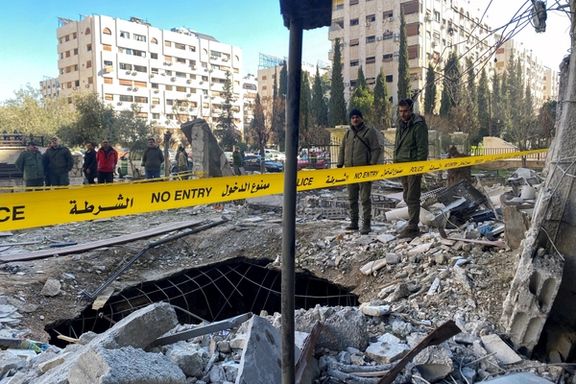
He said one of those killed was a Syrian army civil engineer who worked at Syria's Scientific Studies and Research Centre, which Western countries say is a military institution that has produced missiles and chemical weapons. Damascus denies this.
A regional security source said one Revolutionary Guards engineer involved in Iran’s missile program was seriously injured and transferred to a hospital in Tehran, while two other mid-ranking Guards members at the meeting were unharmed.
Another source, a regional intelligence official familiar with the strike, said the target was part of a covert guided missile production program run by Iran's Islamic Revolutionary Guard Corps (IRGC).
A fifth, regional source with knowledge of the strike and its target, said officials from Iran and Hezbollah had been targeted. The Lebanese group has sent fighters to help Assad drive back rebels who once nearly encircled Damascus.
REVOLUTIONARY GUARDS LOGISTICS CENTRE HIT?
The targeted building was located in the Damascus neighborhood of Kafr Sousa, a heavily policed area where residents say several Iranian security agencies are located, along with an Iranian cultural centre.
Two Western intelligence sources said at the time the target was a logistics center run by the Revolutionary Guards.
Hezbollah's top commander Imad Moughniyeh was killed in 2008 in a bombing in the same neighborhood. Israel denied Hezbollah accusations that it was behind the assassination.
Although officials rarely acknowledge responsibility for specific operations, Israel has been carrying out air strikes on suspected Iranian-sponsored weapons transfers and personnel deployments in Syria for almost a decade.
Israel has also in recent months intensified strikes on Syrian airports and air bases to disrupt Iran's increasing use of aerial supply lines to deliver arms to allies in Syria and Lebanon, including Hezbollah.
Exclusive report by Laila Bassam and Suleiman Al-Khalidi of Reuters
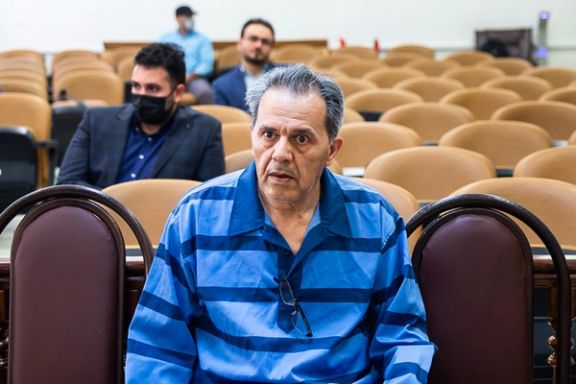
Germany has declared two employees of the Iranian embassy personae non gratae and ordered them to leave the country on Wednesday.
The decision was in protest over Iran sentencing a German national to death, a statement from the foreign office said.
Germany also summoned Iran's charge d'affaires over the issue, Foreign Minister Annalena Baerbock said in a statement, adding: "He was informed that we do not accept the massive violation of the rights of a German citizen."
"We call on Iran to revoke Jamshid Sharmahd's death sentence and provide him with a fair appeal process based on the rule of law," she added.
Sharmahd, a German-Iranian national, was sentenced to death on charges of "corruption on earth", the judiciary's Mizan news agency reported on Tuesday.
The verdict can be appealed.
Iran accuses Sharmahd, who also has US residency, of heading a pro-monarchist group accused of a deadly 2008 bombing and planning other attacks in the country.
On Tuesday, Baerbock called the sentencing "absolutely unacceptable". She said Sharmahd had been denied a fair trial and that the ministry had been refused consular access.
Tensions between Iran and the West have intensified in recent months, pushing already-stalled efforts to revive talks on Tehran's nuclear program further into the background.
Germany has been a vocal backer of EU sanctions against Iran over its crackdown on protesters in the country. The bloc plans to widen the measures to include Iranian actors involved in the Russian war in Ukraine.
Report by Reuters

A veteran reformist and an aide to former President Mohammad Khatami says the totalitarian regime has alienated over 80 percent of Iranians who no longer want the Islamic Republic.
In a speech Sunday, Javad Emam, the CEO of Khatami’s Baran Foundation, which he set up after his presidency came to an end in 2005, argued that the dictatorship’s acting against the will of the people, means they “are the ones actually causing regime change”.
Speaking at the Veterans Society Party’s 4th congress, Emam, the party's secretary general, strongly criticized the government’s foreign policy including regional policies which he said “drove Iran's Arab neighbors to Israel’s bosom”.
Addressing party members, which consist mainly of reformist veterans of the Iran-Iraq War, he said the country's foreign policy had also failed to restore the 2015 nuclear deal which has “resulted in the poverty and misery of Iran and Iranians”, and spurred Iran's collaboration with Russia in its war against Ukraine.
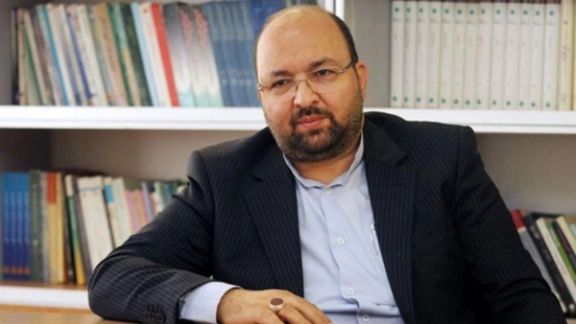
Iran has been supplying military drones to Russia since mid-2022, which Moscow has used to target Ukraine’s infrastructure. The United States and European powers have strongly warned Tehran to cease its military cooperation with Russia.
Khatami’s aide warned the government that “in the near future people will no longer listen to them if it does not listen to the voice of people”.
Emam’s sharp criticism comes on the heels of unprecedented popular protests and statements by other key reformist figures who have either called for a referendum to change the regime or serious and fundamental changes in Iran’s politics and economy.
Khatami said in November that regime change, as protesters demanded on the streets, was “neither possible, nor desirable” due to the inequality of the powers of the government and the people. But he also warned the hardliner establishment over continuing the status quo which he said would only deepen the prospects of “societal collapse”. He proposed reforms in the system as the “least costly and most useful” way out of the current quagmire the regime has gotten itself into.
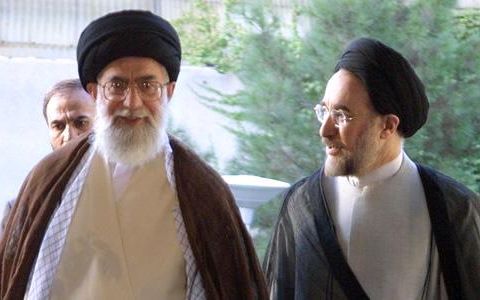
The Green Movement leader Mir-Hossein Mousavi, who was a presidential candidate in 2009 and has been under house arrest since 2011, however, in a statement on February 4, declared that the Islamic Republic was no longer reformable and fundamental change was required to “save Iran”. He proposed elections to appoint a constitutional assembly to write a new constitution and a referendum on the new constitution and its proposed form of government.
A day after Mousavi’s statement, Khatami, who was banned from the media and political activity as well as leaving the country years ago, also issued a statement which many saw as his opposition to Mousavi’s proposal and his insistence on preserving the Islamic Republic at any cost.
In his speech, Emam criticized Mousavi’s views and seemed to be siding with Khatami. He claimed that regime change views are promoted by those who want to cause a rift among reformists and the people.
Khatami and Mousavi both believe in non-violence and are against any foreign interference in Iranians’ affairs, he argued.
He added that before these two leaders’ statements, his own party had in an open letter to the Supreme Leader Ali Khamenei warned about the dire situation in the country and stressed the necessity of deep reforms and returning to the full implementation of the Constitution before it was too late.
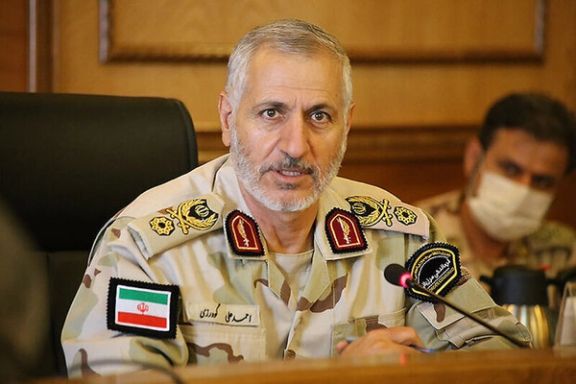
The commander of Iran’s Border Guard claim that a vessel carrying US-made weapons, including “swords” was seized in the Persian Gulf.
Ahmad Ali Goudarzi said the vessel was carrying more than 5,000 machetes and swords made in the United States, claiming that when more blood touches the blades, the sharper they get.
He did produce any photos, evidence or provide other details about the alleged vessel or if any crew were arrested.
Stating that Iran also seized electronic cigarettes and various harmful systems made in the United States, Goudarzi added that over 3,000 other weapons were also discovered that were supposed to be given to the “rioters” in Iran.
Hardliners led by the IRGC call Iranian protesters “rioters” and “thugs”. Iran has been the scene of anti-government protests since September when the 22-year-old Kurdish girl Mahsa Amini was killed in police custody.
The claims by Goudarzi come after the US military announced earlier this month that the US Navy assisted the French military in seizing thousands of assault rifles and half a million rounds of ammunition that were being transferred from Iran to Yemen in January.
US Central Command confirmed over 3,000 assault rifles, 578,000 rounds of ammunition, and 23 anti-tank guided missiles were confiscated.
It also added that the seizure is “one of four significant illicit cargo interdictions over the past two months,” which has prevented the transfer of more than 5,000 weapons and 1.6 million rounds of ammo to Yemen. Another seizure of arms was announced earlier in January.

Iran's national security chief has warned the government of looming food shortages and higher prices, a top-secret letter obtained by Iran International reveals.
In the confidential letter, dated February 5, the secretary of Supreme National Security Council (SNSC) Ali Shamkhani briefed President Ebrahim Raisi of a meeting with food importers and other officials of the agriculture ministry.
Shamkhani expressed concerns about prices of animal feed, particularly warning that prices for maize, barley and soybean meal will rise, affecting the production of poultry, eggs, red meat, milk and dairy products. He said the prices of soybean meal will probably double in the next few weeks, leading to a jump in the cost of meat.
According to the letter, the country will also face a shortage of maize or corn within one or two months as Brazil – which had been replaced by many countries as the main exporter – has run out of the produce and Ukraine will not supply Iran with its needed corn.
Iran has been supplying Russia with kamikaze drones that are used against Ukrainian infrastructure targets.
To provide the needed corn, Iran should buy from intermediaries, which will cost $30 to $40 more per ton, Shamkhani noted.
Iran’s economy, especially imports, are tightly controlled by the government that supplies the hard currency needed. The private sector has become largely dependent on the government for obtaining US dollars to import raw materials and food. With US sanctions crippling Iran’s oil export revenues, the government is short of hard currency and the Iranian rial has dropped by more than 60 percent in six months.
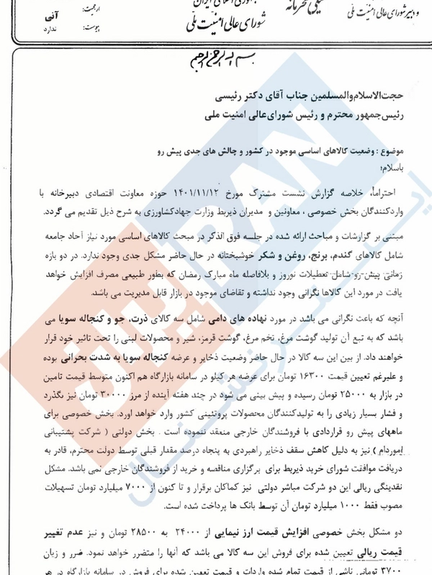
The letter also revealed that the Islamic Republic has not finalized any contract with foreign sellers for the coming months. Soybean meal, barley and corn for livestock and chicken feed are mainly imported from Russia and other countries. Iran annually imports around 8 million metric tons of corn, 4.2 million metric tons of soybean meal, and 400,000 metric tons of barley for animal feed. Any shortages or higher prices can further push up the price of meat.
Head of the Meat and Protein Industry Association of Iran said last week that amid reports about a sharp increase in food prices demand for red meat has decreased by 50 percent in the past one year.
Shamkhani also said that the Central Bank of Iran has not allocated any foreign currency to provide for animal feed in the past 37 days because the foreign currency transfer line via Trade Bank of Iraq has faced difficulties.
Recently, the United States imposed tougher regulations on Iraqi bank transfers to restrict Iran’s money laundering ability in the neighboring country. The secret letter proves that indeed Iraq was used to obtain US dollars.
The letter also revealed that the county needs about $1.4 billion for clearance of the goods that are stuck at the countries’ ports due to a lack of foreign currency.
Iran’s Customs Administration said earlier in the month that at least eight million tons of essential goods have been piling up on ships anchored off the country's southern ports apparently mainly due to payment issues.
According to a report by Tasnim news agency, affiliated with the Revolutionary Guard, the deputy head of the Customs Administration has recently said that ships are stranded at Persian Gulf ports waiting to unload their cargo.
Importers need to receive US dollars or other foreign currencies from the government to pay suppliers before the ships would anchor at the ports and discharge their cargos. Iran is currently in a crisis for not having enough foreign currency and the US dollar has reached a historic high. One dollar can buy 500,000 Iranian rials, while five years ago the exchange rate was around 35,000.
In January, Iran’s judiciary chief Gholam Hossein Mohseni Ejei said tens of ships have arrived in territorial waters of the country, but the Islamic Republic cannot unload them therefore the country must pay fines for the delay in discharging cargos. The delay in payments is the main reason that has disrupted flows of goods into the country.